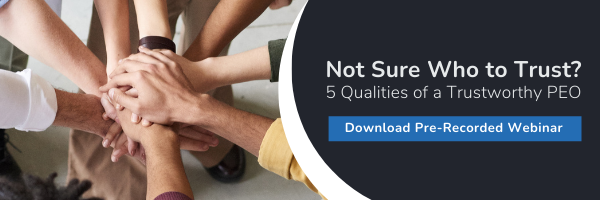Topic Outsourcing HR / PEO
How can PEOs Support a Flexible Workforces?
.jpg)
November 3, 2023 | By Questco
.jpg)
Remote work and telecommuting are becoming as common as flextime was in the 1980s. More and more employers are utilizing a flexible workforce of hybrid arrangements to meet changing business needs. But managing a dispersed, mobile, and agile workforce brings challenges. This is where partnering with a professional employer organization (PEO) can enable organizations to build and support flexible teams efficiently while minimizing risk.
With the rise of remote workspaces and video conferencing, many companies are now harnessing the power of hybrid arrangements to access specialized talent and boost engagement.
However, operationalizing flexible arrangements requires expertise. What are some of the key considerations when implementing a flexible workforce model?
What challenges come with managing a flexible workforce?
Managing a flexible workforce comes with unique challenges around compliance, culture, and analytics that require specialized support.
On the compliance front, companies adopting flexible arrangements must ensure adherence to labor regulations around worker classification, overtime pay, benefits eligibility, and more. With employees working non-traditional schedules in dispersed locations, it can be complex to ensure policies align with legal standards.
Building an inclusive, cohesive culture across full-time office staff, remote employees, part-time workers, freelancers and independent contractors requires intention and effort. With diverse work styles and flexible schedules, fostering collaboration, connection, and engagement can be difficult.
Analytics are key to tracking performance and results across a dispersed workforce. But how do you aggregate analytics when you have employees around the country?
With specialized support around compliance, culture building, and data analytics, PEOs provide the infrastructure and expertise needed to tackle core flexible workforce challenges.
How do PEOs support flexible work arranagements?
PEOs offer a wide range of services tailored to the unique needs of flexible workforces.
For benefits administration, they can provide access to health insurance, retirement plans, and other benefits that include part-time, contract, and remote workers who may not qualify under traditional employer plans.
For payroll, PEOs smoothly handle payrolls that include hourly, salaried, part-time, and contingent workers across multiple locations. They can handle tax filings and year-end documentation for flexible employees.
PEOs stay current on laws and regulations impacting independent contractors, remote workers, and alternative schedules to ensure policies comply with IRS, labor, and other rules. Their compliance expertise is invaluable.
They also offer robust HR services like sourcing, screening, on-boarding, training, and managing performance for the entire flexible workforce. This consistency across all worker types is key.
PEOs give companies access to the latest scheduling systems, collaboration platforms, equipment and workspaces needed to enable remote and hybrid arrangements.
For contingent workers, PEOs can oversee the entire lifecycle from sourcing, on-boarding, managing, and off-boarding flexible talent. Of course, the actual hiring and firing decisions remain with you.
PEOs also train leaders and managers on best practices for leading, engaging and evaluating productivity across blended teams with diverse work styles.
With this full spectrum of tailored support, PEOs provide the infrastructure and expertise to optimize flexible workforces. Of course, careful planning is still required before implementation.
What should you consider?
What key considerations are there for implementing flexible workforces?
Implementing a flexible workforce takes careful planning and preparation.
First, thoroughly assess your organizational needs. Are there skills gaps flexible arrangements could help fill? Use workforce analytics to identify roles suited for remote work or part-time schedules. Evaluate costs and benefits to determine potential ROI.
Develop clear and thoughtful flexible work policies around scheduling, core hours, time off approvals, equipment provisions, and workspace stipends. Provide robust training to managers on leading remote teams, evaluating performance, fostering culture, and more. Plan internal communications to explain changes and gather feedback.
Leverage your PEO as an expert resource throughout this process. They can provide detailed data analysis, help craft policies that balance flexibility and business needs, supply change management guidance, and tailor support to your unique requirements.
With the right strategic planning, manager training, culture focus, and PEO expertise, you’ll be equipped to build an agile, productive, flexible workforce.
In today's dynamic business environment, flexible arrangements are here to stay. As we’ve seen, partnering with a PEO can provide the essential infrastructure and expertise to successfully leverage the potential of workforce flexibility.
PEOs as Your Base of Support
PEOs provide the essential support structure to unlock the benefits of a flexible workforce. They handle the complex administration so companies can focus on business goals.
For employers, PEOs mean access to specialized talent, increased productivity, and lower costs through optimized flexible arrangements. For employees, work-life balance, engagement, and motivation improve with schedule flexibility.
As remote workspaces, video conferencing, and flexible schedules continue evolving, PEOs will remain invaluable partners in leveraging this work model. They supply expertise, administration, and resources so companies can be agile and competitive now and in the future.
The future looks bright for flexible work supported by PEOs. Organizations that embrace it will thrive, and employees will feel empowered. Partnering with a PEO paves the way for flexible workforce success.



